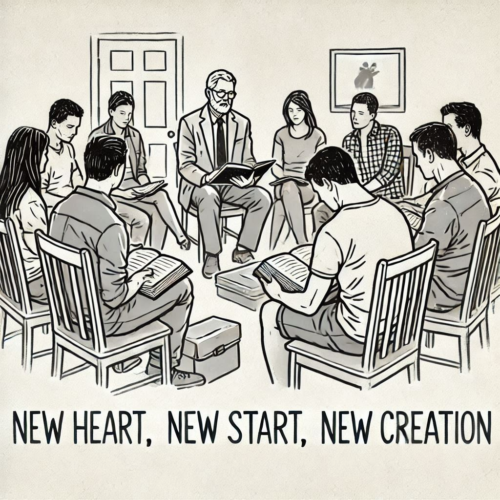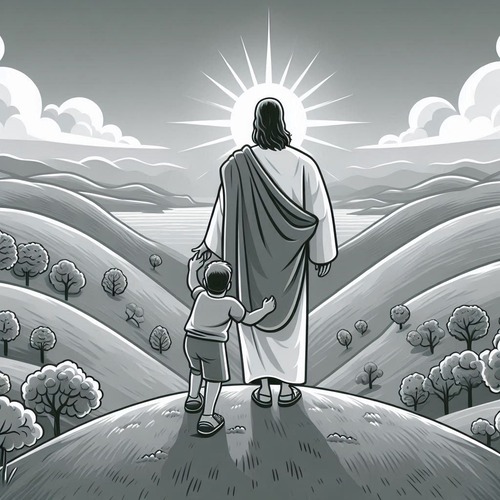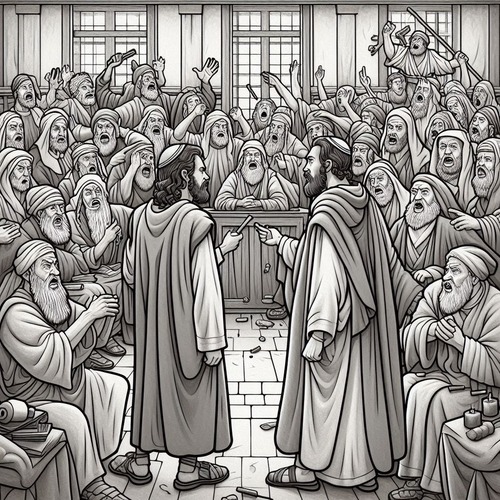What Does It Mean to Become a New Creation in Christ?
“Therefore, if anyone is in Christ, he is a new creation. The old has passed away; behold, the new has come.” These words from 2 Corinthians 5:17 represent one of Scripture’s most profound declarations about the transformative power of salvation. But what does it truly mean to become a new creation? This question strikes at the heart of authentic Christian experience and deserves careful examination.
The Natural State of Man
To grasp the magnitude of becoming a new creation, we must first understand our natural condition. Apart from divine intervention, humanity exists in a state of spiritual death. This isn’t merely an impairment or slight misalignment with God’s will—it’s a complete inability to seek or please God. Our natural hearts aren’t spiritually neutral but actively opposed to God’s authority and holiness.
This natural condition affects every aspect of our being—our thoughts, desires, choices, and actions all flow from a heart that Scripture describes as “desperately sick” (Jeremiah 17:9). We don’t merely make occasional wrong choices; our very nature is corrupted, rendering us unable to truly love God or pursue His glory.
Understanding True Regeneration
Becoming a new creation is fundamentally God’s work, not ours. This transformation occurs when God sovereignly gives spiritual life to those who’re spiritually dead. Like Jesus calling Lazarus from the tomb, God speaks life into our dead souls, creating new spiritual capacities and desires where none existed before.
This regeneration is instantaneous and supernatural. It’s not a gradual process of improvement but a decisive act of God that radically changes our spiritual nature. Through this divine work, we receive new spiritual faculties—eyes that can truly see God’s beauty, ears that can hear His truth, and hearts that can respond to His love.
Evidence of Being a New Creation
True regeneration produces visible evidence in the believer’s life. The first and most fundamental sign is a new relationship with God, characterised by genuine faith and love. Where once there was indifference or hostility toward God, there is now a deep desire to know and please Him.
This transformation manifests in several key ways:
- A new love for Scripture and spiritual truth
- A growing hatred of sin and love for holiness
- A genuine desire for fellowship with other believers
- A persistent, though imperfect, pursuit of God’s will
The Ongoing Process of Sanctification
While regeneration is instantaneous, it inaugurates a lifelong process of transformation called sanctification. The new creation begins perfect in its nature but not in its degree. Like a newborn baby, it possesses all the necessary faculties but requires growth and development.
This sanctification process involves both divine and human activity. God continues His transforming work while we actively pursue holiness through the means of grace He provides. We experience both progress and struggles, victories and failures, but the overall trajectory is toward greater Christlikeness.
Practical Implications
Being a new creation fundamentally changes how we view ourselves and live our lives. This new identity becomes the foundation for our actions and choices. We no longer live as spiritual orphans trying to earn God’s favour, but as beloved children seeking to honour our loving Father.
This transformation affects every aspect of life:
- How we handle temptation
- Our relationships with others
- Our approach to work and responsibilities
- Our use of time and resources
The Ultimate Purpose
The ultimate purpose of our new creation is the glory of God. Through this transformation, God displays the riches of His grace and the power of His saving work. Our changed lives become living testimonies to His mercy and power, drawing others to recognise His greatness.
This new creation reaches its culmination in our future glorification, when we will be perfectly conformed to Christ’s image. Until then, we live in the tension of being new creatures who still battle with remaining sin, yet always pressing forward in faith.
Conclusion
Becoming a new creation in Christ represents far more than adopting new beliefs or behaviours. It’s a supernatural transformation that affects every aspect of our being. This divine work provides the foundation for genuine Christian living and the hope of ultimate conformity to Christ’s image.
As we consider these truths, let’s examine our hearts. Have we experienced this supernatural transformation? Do we see evidence of new spiritual life? Remember, this work is entirely of God, and He receives all the glory for any genuine transformation in our lives.
May these truths drive us to worship the God who makes all things new and to live in a manner worthy of this radical transformation He has worked—and is working—in us.
A New Creation—Related FAQs
Can I become a new creation through self-improvement or positive thinking? True spiritual transformation isn’t achievable through human effort or mindset changes. The new creation is exclusively God’s supernatural work, recreating our spiritual nature through His sovereign power. No amount of self-help, meditation, or positive thinking can produce the fundamental heart change that characterises genuine spiritual rebirth.
- If I’m a new creation, why do I still struggle with sin? While regeneration gives us a new nature that loves God and hates sin, we continue to battle with our old nature until glorification. This ongoing struggle actually evidences true conversion, as only those made alive in Christ experience genuine grief over sin and desire for holiness. The presence of this internal conflict, rather than disproving our new nature, confirms it.
- How can I know if my conversion experience was genuine? The genuineness of conversion isn’t primarily measured by emotional experiences or the specific circumstances of when you believed. Rather, look for ongoing evidence of spiritual life: growing love for God’s Word, increasing hatred of sin, genuine love for fellow believers, and perseverance in faith despite difficulties. These fruits, while imperfect, demonstrate the reality of God’s transforming work.
What’s the difference between reformation and regeneration? Reformation involves external behavioural changes and moral improvements, while regeneration is a supernatural heart transformation that changes our fundamental nature. True regeneration produces reformation, but reformation alone doesn’t indicate regeneration. The key distinction lies in the source and depth of the change—human effort versus divine power.
- Can someone lose their status as a new creation? Those whom God genuinely transforms will persevere to the end because the new creation is God’s work, not ours. While true believers may experience seasons of struggle or apparent backsliding, God preserves His work of regeneration in them. The same divine power that creates new life also maintains it.
- Why do some people seem to change dramatically at conversion while others change more gradually? While regeneration itself is instantaneous, its visible manifestations may vary significantly among believers. Some may experience dramatic external changes immediately, while others show more gradual visible transformation. The essential nature of the change is the same in all true converts, though its external expression may differ.
Does being a new creation mean I’ll always feel close to God? The new creation fundamentally changes our relationship with God but doesn’t guarantee constant feelings of closeness or spiritual highs. Genuine believers may experience seasons of spiritual dryness or distance while still possessing the new nature God has given them. Our standing as new creations rests on God’s unchanging work, not our changing emotions.
Editor's Pick

Should We Stop Using Male Pronouns for God? Why Do We Say No?
A friend of ours arrived eagerly at his first theology class in seminary. But he quickly discovered something troubling: the [...]

Did Old Testament Law Force Women to Marry their Rapists?
**Editor’s Note: This post is part of our series, ‘Satan’s Lies: Common Deceptions in the Church Today’… Viral misinformation abounds [...]

From Danvers To Nashville: Two Statements, One Biblical Vision
30 years separate the Danvers Statement on Biblical Manhood and Womanhood (1987) and the Nashville Statement on Human Sexuality (2017). [...]

The Nashville Statement: Why Affirm It Despite Media Backlash?
WHY DO REFORMED CHRISTIANS STAND BY THIS STATEMENT ON MARRIAGE AND GENDER? When the Nashville Statement was released in 2017, [...]

Who Is Belial? Solving The 2 Corinthians 6:15 Mystery
Belial: This name from the pages of Scripture chills the soul. Who is this mysterious figure Paul invokes in 2 [...]

Celibacy Or Castration: What Jesus Really Means in Matthew 19:12
One of Scripture's most shocking misinterpretations led theologian Origen to castrate himself in the third century. His tragic mistake? Taking [...]

Philippians 4:13: Did Paul Really Mean We Can Do ALL Things?
"I can do all things through Christ who strengthens me." It's on gym walls, graduation cards, and motivational posters everywhere. [...]

The Ordinary Means of Grace: Why Are They Indispensable?
ORDINARY MEANS FOR EXTRAORDINARY TRANSFORMATION What if God's most powerful work in believers' lives happens through the most ordinary activities? [...]

Is the Bible God’s Word? Or Does It Only Contain God’s Word?
The authority of Scripture stands at the crossroads of modern Christianity. While some argue the Bible merely contains God’s Word [...]

Will We Remember This Life in Heaven? What Isaiah 65:17 Means
"Will I remember my spouse in heaven? My children? Will the joy we shared on earth matter in eternity?" These [...]
SUPPORT US:
Feel the Holy Spirit's gentle nudge to partner with us?
Donate Online:
Account Name: TRUTHS TO DIE FOR FOUNDATION
Account Number: 10243565459
Bank IFSC: IDFB0043391
Bank Name: IDFC FIRST BANK






